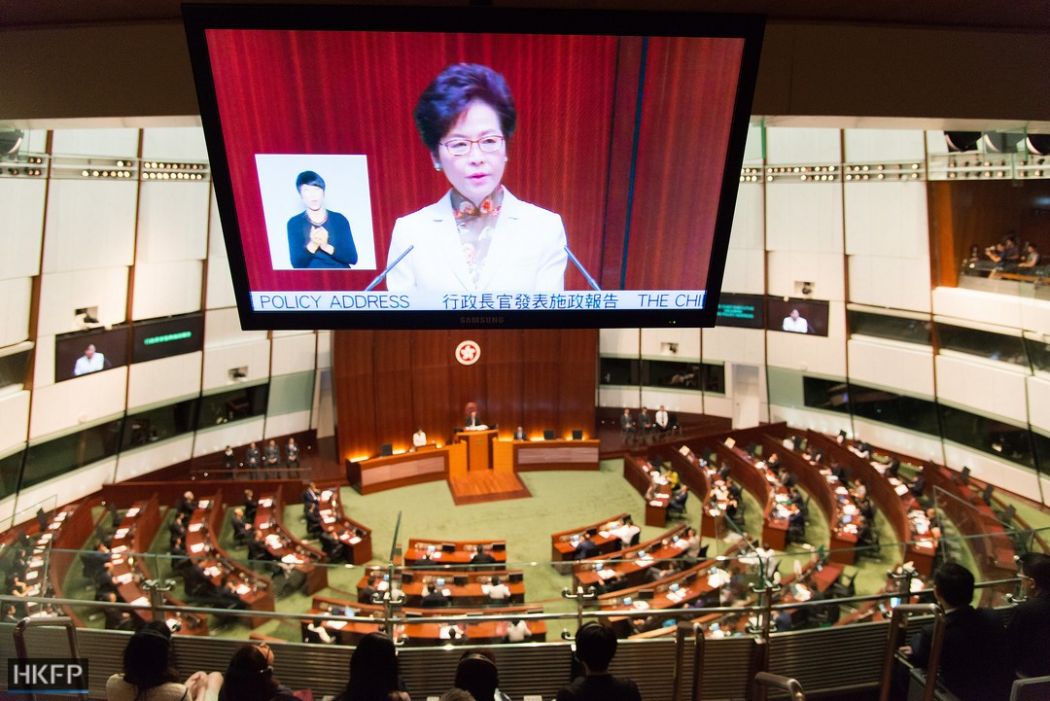Here’s a tip for aspirant Chief Executives of the Hong Kong SAR – do all you can to have a predecessor such as CY Leung. It’s worked really well for Carrie Lam, who basks in the comparison between herself and the former incumbent.
CY had a singular talent for alienating people and did not seem to be that enamoured with Hong Kong either as he would scuttle across the border at the slightest pretext. Therefore not being CY has proved to be a useful way of cultivating popularity.

However Ms Lam cannot just rely on not being CY, tempting as it may be. This week she was required to put some flesh on the way forward for her administration by way of the annual policy address.
She got off to a flying start by avoiding the torture by boredom which has been a hallmark of all previous policy addresses, which involved stolidly ploughing through the kind of civil service prose that gives turgid a bad name.
These orations seemed to last for days, but I am reliably informed that this is not so as they only lasted for hours. But, as is often the case with torture, the mind plays tricks and you imagine it has gone on much longer than it actually has.
Ms Lam, however, was brief and to the point. She was markedly brief in addressing the two elephants in the room that were avoided in this policy address altogether, namely constitutional reform and anti-subversion legislation. According to the Chief Executive, she is waiting for a ‘suitable time’ to tackle these pressing matters.
Yet in her speech she said the vision of a ‘united, harmonious and caring’ society is ‘not that far off’. So, why the delay?

A number of explanations have been proffered but the most plausible is that the Chief Executive was instructed by her bosses in Beijing to keep away from sensitive political issues in the run up to the 19th Chinese Communist Party Congress. They view this period as one in which nothing should be allowed to disturb the smooth running of the party’s party.
However these political issues cannot be ducked forever, as Ms Lam knows full well. Indeed the party’s leadership has publicly told her that she must re-introduce the kind of draconian anti-subversion legislation that was knocked back the last time it was proposed by Tung Chee-hwa.
Meanwhile Ms Lam was not blessed by the turn of events as while she was telling the world that Hong Kong’s respect for human rights, freedom of the press and freedom of expression could be counted among the SAR’s ‘core values’ it was revealed that Benedict Rogers, a British human rights activist, had been barred from entering Hong Kong.
The denial of entry for activists who challenge government policy is a hallmark of all repressive regimes. Notably, this kind of behaviour is not unusual on the Mainland therefore it requires little imagination to understand who gave the orders to ban Mr Rogers.
Hong Kong was most certainly not like that in the past as previous governments appeared to understand the jeopardy of joining the unedifying company of states that are too nervous to allow critics to enter their borders. If Ms Lam’s rhetoric about freedom is to have the slightest meaning she will need to make sure that this does not happen again. However, her immediate rambling response to the incident does not provide comfort for the future.

The overwhelming bulk of this year’s policy address was devoted to economic and social issues, which is not a bad thing. The problem is that her policy initiatives are most likely give comfort to the more comfortable.
Businessmen and technology companies will be happy with generous tax breaks and aspirant middle class people will clearly welcome a better chance to get on the housing ladder. However there was precious little in the plan to address the needs of the 20 per cent of the population who live below the poverty line.
This is especially the case when it comes to housing, where the Lam administration has decided to move the emphasis from building public housing to creating more home ownership provision. Although the Home Ownership Scheme has many benefits the administration’s myopic view is that it can only be developed at the expense of the poorest families who are queuing up for public housing.
At least the new Chief Executive did not follow her predecessor’s obnoxious policy of announcing lavish one-off cash handouts, designed to engender popularity but ending up being little more than a shameless waste of money and a very poor substitute for proper public policy to address real needs.
Compared with the miserably low standards set by the policy addresses of the three previous Chief Executives, Mrs Lam did a lot better – but improving on the inadequate is hardly a recipe for continued success.
